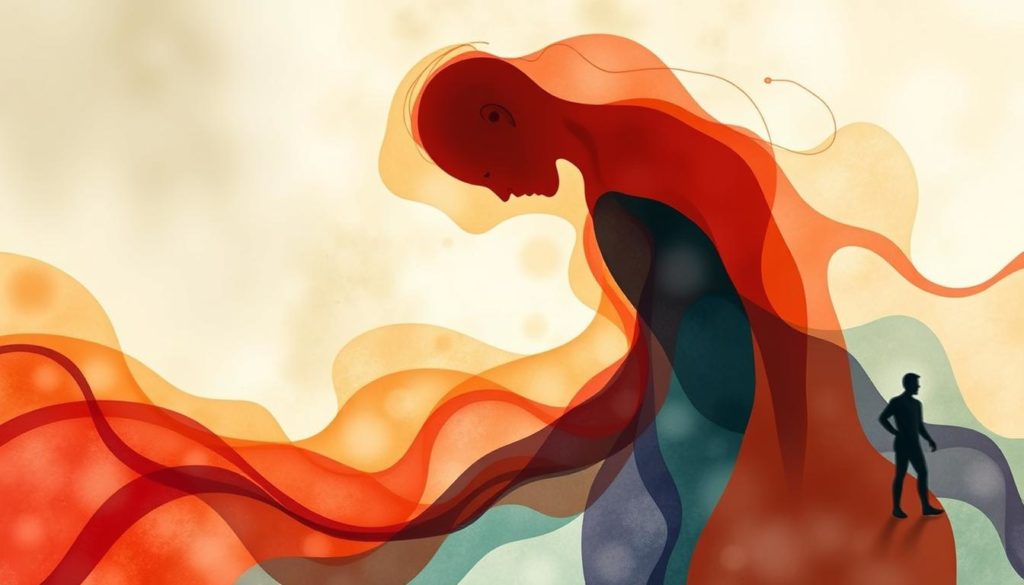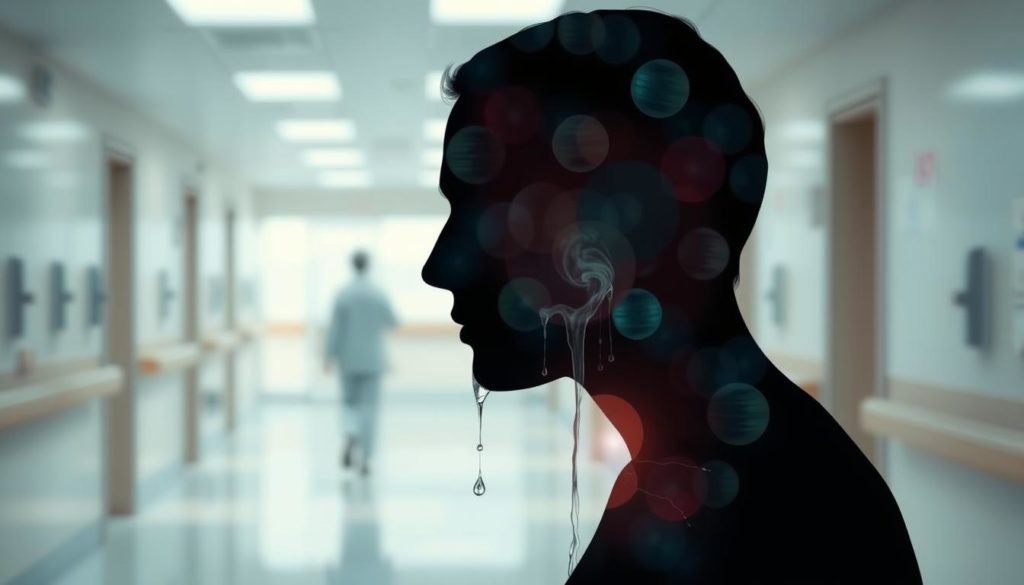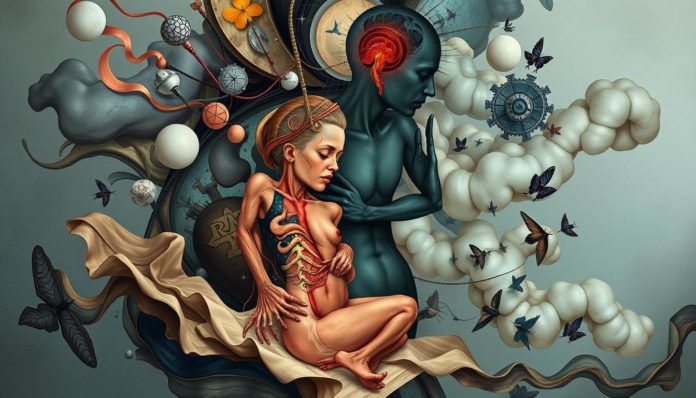Did you know that nearly 90% of men undergoing prostate cancer treatment experience significant side effects? This startling figure underscores the critical need for early intervention and proper management. Understanding the Side Effects of Advanced Prostate Cancer Treatment can make a significant difference in improving quality of life.
The treatment for prostate cancer can affect urinary, bowel, and sexual functions. This is due to the prostate’s location near these vital structures. Talking openly with healthcare providers about any prostate cancer medication side effects is crucial for prompt and effective management.
Early management of side effects is key. It often involves a combination of medical interventions and lifestyle adjustments.
In this comprehensive guide, we delve into the side effects associated with advanced prostate cancer treatments. We offer insights into their prevalence, impact, and strategies for dealing with side effects advanced prostate cancer treatment. With the right approach, patients can maintain a good quality of life throughout their cancer journey.
Introduction to Prostate Cancer Treatment Side Effects
Prostate cancer treatments can have many side effects. These can change a patient’s daily life. It’s vital for patients and their families to learn about these effects.

Prostate Cancer and its Treatments: A Brief Overview
There are several ways to treat prostate cancer. Options include surgery, radiation, hormone therapy, and chemotherapy. Each has its benefits and downsides. The treatment chosen depends on cancer’s stage and the patient’s health.
Being informed about the side effects of advanced prostate cancer is key, regardless of the chosen treatment.
Why Side Effects Occur
Side effects often happen because the prostate is close to the bladder and rectum. Treatment can affect these organs, causing various side effects. It can also impact nerves related to urinary and sexual functions.
Managing these side effects well is crucial. It helps patients maintain their quality of life and well-being.
Urinary Dysfunction after Prostate Cancer Treatment
Many men worry about urinary dysfunction after prostate cancer treatment. The side effects can feel overwhelming. But knowing about the different types of urinary issues and management strategies can greatly help.
Types of Urinary Dysfunction
Urinary dysfunction after prostate cancer treatment can vary. You might experience:
- Urinary incontinence: This is when you accidentally leak urine. It might just be a few drops or a constant dribble.
- Urgent urination: This occurs when you suddenly need to pee without notice.
- Frequent urination: You may find yourself needing to go more often. This can interrupt sleep or daily routines.
- Painful urination: This is when peeing causes discomfort or even pain, possibly due to irritation or infection.
Managing Urinary Incontinence
Handling urinary incontinence often means changing your lifestyle, getting medical help, and talking openly with doctors. Managing its side effects may include:
- Pelvic floor exercises: Doing Kegels strengthens your pelvic muscles, which can help control your bladder.
- Bladder training: You can train your bladder by slowly waiting longer between bathroom breaks.
- Medication: Some drugs can lessen the urge and need to pee so often.
- Medical devices: For serious cases, tools like external urine collectors or urethral inserts might be suggested.
- Surgery: Sling procedures or artificial sphincters are rare but possible options.

Coping with Erectile Dysfunction Post-Treatment
Erectile dysfunction is a common side effect after treating prostate cancer. It can deeply affect a person’s self-worth, relationships, and happiness. Knowing about this issue and looking into treatments can help a lot.
Impact on Sexual Health
Treatments like surgery and radiation can harm the nerves and blood vessels that are needed for an erection. This can cause erectile dysfunction. It can change a man’s sexual health a lot.
The emotional impact of losing sexual function can be significant. It affects how a man sees himself and his relationships. Talking openly and seeking advice are key steps in dealing with these changes.
Treatment Options for Erectile Dysfunction
Various treatments can help those facing erectile dysfunction from prostate cancer treatment. Here are some:
- Medications: Drugs like Viagra, Cialis, and Levitra can improve blood flow to the penis.
- Vacuum Erection Devices (VEDs): These create a vacuum that draws blood into the penis.
- Penile Injections: Medicines can be injected into the penis to help with erections.
- Surgical Implants: Implants can offer a lasting solution to erectile dysfunction.
Each treatment option has different outcomes and possible side effects. It’s important to work with a healthcare provider to find the best approach for you.
Bowel Problems as a Side Effect
Bowel issues are a frequent downside during prostate cancer treatment. Patients may face rectal bleeding, diarrhea, or a sudden need to go. These issues can change how they live every day.
Treatments might harm the rectum, leading to these problems. It’s key to manage these prostate cancer treatment side effects with care. There are ways to ease bowel issues:
- Eating high-fiber foods can help with bowel control and lessen diarrhea or constipation.
- Some drugs, either prescribed or over-the-counter, may help with specific symptoms.
- Seeing healthcare providers regularly helps get support tailored to each patient, keeping their life quality.
The table below shows some usual bowel issues from prostate cancer treatment and their possible fixes:
| Common Bowel Problems | Possible Solutions |
|---|---|
| Rectal Bleeding | Medication, avoiding certain foods, and ensuring proper hydration |
| Diarrhea | High-fiber diet, anti-diarrheal drugs, and drinking fluids |
| Urgency | Planning bathroom visits, doing pelvic floor workouts, and managing stress |
Dealing with bowel problems prostate cancer treatment side effects head-on helps patients heal better. It’s crucial to talk to doctors for advice that fits the individual’s needs.
Surgery Side Effects: What to Expect
Having surgery for prostate cancer, like a prostatectomy, brings different side effects. Knowing about these effects is key. This helps with managing recovery and setting the right expectations.
Common Post-Surgery Issues
Many men face urinary incontinence after prostate cancer surgery. It’s hard to control the bladder at first. But, with time and exercises, this can get better.
Erectile dysfunction is also common after surgery. There are treatments, yet it worries a lot of men. For helpful tips, check the Prostate Cancer Foundation.
Long-term Effects of Prostatectomy
One lasting effect is losing fertility. The surgery removes prostate and seminal vesicles. Thus, natural fatherhood becomes unlikely. Yet, sperm banking before surgery is an option for those wanting children later.
Some men might deal with ongoing urinary issues or sexual health problems years later. Knowing about these side effects of prostate cancer surgery is important. It helps in getting the right support.
Talking with doctors about prostatectomy side effects is crucial. It improves care after surgery and life quality.
Side Effects of Advanced Prostate Cancer Therapy
When fighting advanced prostate cancer, patients face many challenges. Hormone treatments, which lower testosterone levels, can have big side effects. These can greatly affect the patient’s life.
Changes in body hair growth can occur with hormone therapy. Patients may lose body hair as hormone levels change. They might also lose muscle mass. This can make them weaker and less mobile.
Sexual health can be hit hard too. Many lose interest in sex and struggle with erectile function. This means they need special care and strategies to cope.
Here is a detailed look at some common side effects:
| Side Effect | Description |
|---|---|
| Body Hair Changes | Decrease in hair growth due to hormone level alterations. |
| Muscle Mass Loss | Reduction in muscle strength and mass. |
| Sexual Desire | Decrease in sexual interest and drive. |
| Erectile Function | Challenges in maintaining or achieving an erection. |
Understanding the side effects helps patients and doctors work together better. They can create treatment plans that improve life while fighting cancer.
Radiation Treatment Side Effects
Radiation treatment for prostate cancer has various side effects. It’s crucial for patients to understand these. This knowledge helps improve their quality of life.
Short-term Complications
Short-term issues from radiation therapy include urinary symptoms. Patients might experience increased frequency or difficulty urinating. They may also have skin irritation in the treatment area and feel tired.
- Frequent urination
- Difficulty urinating
- Skin irritation
- Fatigue
Long-term Consequences
Long-term side effects of prostate cancer radiation affect urinary, bowel, and sexual functions. Problems like persistent bladder issues, bowel dysfunction, and erectile difficulties can appear months or years after treatment.
It’s vital for patients to know about these long-term effects. Close work with healthcare providers can help manage them well.
| Long-term Side Effects | Description |
|---|---|
| Urinary dysfunction | Persistent bladder issues, including incontinence |
| Bowel dysfunction | Chronic diarrhea or bowel urgency |
| Sexual dysfunction | Difficulty achieving or maintaining erections |
By knowing the short-term and long-term side effects, patients can better handle radiation therapy impacts. This preparation can improve their outcomes.
Hormone Therapy Adverse Effects
Treating prostate cancer with hormone therapy has big benefits. Yet, it does bring some side effects because of the changes in testosterone levels. Handling these side effects is very important for the patient’s health.
Impact on Testosterone Levels
Hormone therapy lowers testosterone, needed for the growth of some prostate cancers. This can lead to lower sexual desire and problems getting or staying erect. It’s important to pay attention to these effects as they affect life quality. You can learn more about how testosterone is reduced here.
Managing Hormonal Side Effects
Dealing with hormone therapy side effects needs several steps. Using medicines, changing your lifestyle, and getting emotional support are key. For example, medicines can help with losing muscle and bone strength.
Changes like exercising and eating well help with tiredness and gaining weight. Also, talking to a counselor or joining a support group helps with emotional issues. For more info on these side effects, check out this resource.
Chemotherapy Side Effects
Chemotherapy for prostate cancer is powerful against cancer cells. But, it can also harm healthy cells. This leads to various side effects. Knowing about these effects helps manage treatment better.
Common Reactions to Chemotherapy
Many people getting chemotherapy face similar side effects. They often feel very tired, which affects their daily life. Nausea and vomiting are also common, so keeping anti-nausea medicine nearby is important. Losing hair can be upsetting. The treatment may also weaken the immune system, raising the risk of getting sick. Knowing what to expect can help people handle these effects.
Handling Chemotherapy Side Effects
To manage side effects, use medicines, change your lifestyle, and get medical help. For fatigue, mix rest with some light exercise. Anti-nausea medications can lessen stomach issues. Using soft hair products can ease the stress of hair loss. To prevent infections, keep clean, avoid large groups, and stay updated on vaccines. These steps can improve life quality during chemotherapy for prostate cancer.
FAQ
What are common side effects of advanced prostate cancer treatment?
Advanced prostate cancer treatment can cause several side effects. These include urinary dysfunction, bowel issues, and sexual health problems. Hormone therapies may change your body hair, muscle mass, and sexual desire.
Why do side effects occur during prostate cancer treatment?
Side effects happen because the prostate is close to organs that control urination, bowel movements, and sex. Surgery and radiation can affect these areas. This may cause problems.
What types of urinary dysfunction can occur post-treatment?
After treatment, you might face urinary problems. These can include incontinence or symptoms like more frequent urination. Pain during urination can also happen. It’s due to changes in bladder control.
How can urinary incontinence be managed after prostate cancer treatment?
To manage urinary incontinence, try lifestyle changes and pelvic floor exercises. You might need medications or surgery too. It’s important to talk with doctors for advice.
How does prostate cancer treatment affect sexual health?
Treatment can affect nerves and blood vessels, causing erectile dysfunction. This could harm your self-esteem and relationships. However, there are treatments available. Medications and surgery can help.
What treatment options are available for erectile dysfunction post-prostate cancer treatment?
You have many options to treat erectile dysfunction. These include oral medications, vacuum devices, injections, hormone therapy, and implants. Discuss with your doctor to find the best solution.
What bowel problems might arise from prostate cancer treatment?
Bowel issues like rectal bleeding, diarrhea, or urgency can result from treatment. To manage these, adjust your diet or take medications. Supportive care is also helpful.
What are the common post-surgery issues following a prostatectomy?
After prostate surgery, urinary incontinence and sexual problems are common. Some effects may improve over time. However, fathering children naturally may no longer be possible.
What long-term effects can be expected after prostatectomy?
Long-term, you might face ongoing urinary incontinence or sexual dysfunction. Some people improve, but others need continuous care. Discuss with your healthcare team for support.
What are the side effects of advanced prostate cancer therapy?
Hormone treatments for prostate cancer can cause side effects. These include changes in body hair, muscle loss, and reduced sex drive. Erectile dysfunction may also occur. Coping with these side effects requires a team effort.
What short-term complications can arise from radiation treatment?
Radiation may cause immediate problems like urinary and bowel issues. Symptoms include more frequent urination and diarrhea. It’s crucial to work with your medical team for relief.
What are the long-term consequences of radiation treatment for prostate cancer?
Radiation can lead to lasting problems with urination, bowel functions, and sexual health. Creating a care plan with your doctor is key for a better life.
How does hormone therapy impact testosterone levels?
Hormone therapy lowers testosterone, impacting your sex drive and physical appearance. Keeping track of testosterone levels helps manage these effects.
How can hormonal side effects be managed?
Tackling hormonal side effects means using medicines, changing your lifestyle, and getting the right nutrition. Emotional support is also vital.
What are common reactions to chemotherapy for prostate cancer?
Chemotherapy can lead to tiredness, nausea, hair loss, and a greater risk of infections. It’s important to actively manage these with your medical team’s help.
How can chemotherapy side effects be handled?
Managing chemo side effects involves using specific medications, changing your diet, getting enough rest, and avoiding infections. Always talk to your healthcare team for the best strategies.


